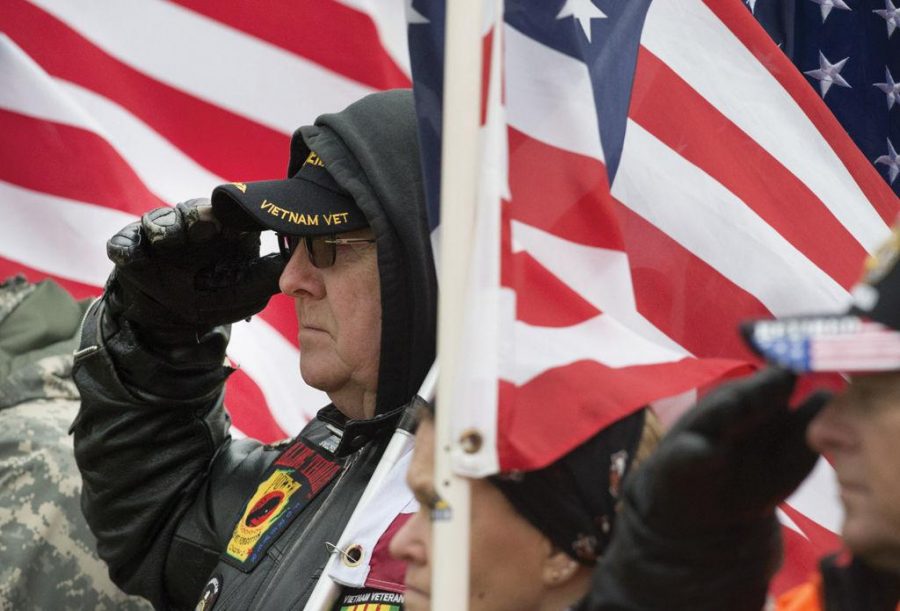Pittsburgh named top spots for veterans
November 12, 2014
Pittsburgh may not be the perfect place to build a white picket fence, but, for veterans, it’s the top place to begin their American Dream sequence.
Pittsburgh was the top-ranked city on the United Services Automobile Association 2014 list of best places for veterans to start their careers after service, which was released at the end of October. Some of Pittsburgh’s largest employers, such as Alcoa, a metal manufacturer, and FedEx, actively seek veterans for starting positions according to company policy.
When Ryan Sheets, a 25-year-old Pitt undergraduate, finished his four years in the Air Force in 2013, he faced a difficult decision: what to do next. Sheets began researching and found that Pittsburgh claimed the top spot in USAA’s 2012 rankings, so he chose Pittsburgh as his next destination.
“I don’t think I would be here if it weren’t for the Office of Veterans Services,” Sheets said. “[Pittsburgh] also has a strong contingency of veterans. I don’t feel like an outsider.”
Victory Media designated Pitt a “2015 Military Friendly School,” which the Pittsburgh-based, military services firm awards to the top 15 percent of schools working to dedicate resources to military students. Additionally, Pittsburgh is home to a VA Healthcare System with a campus in Oakland. Pennsylvania also does not tax military retirement pay, as opposed to the majority of other states.
Hiring Our Heroes, which partnered with the USAA to create the list, utilized Sperling’s BestPlaces and the Institute for Veterans and Military Families at Syracuse University to study three categories: starting out, mid-career and military retirement. Within the categories, Hiring our Heroes surveyed factors like G.I. Bill enrollment, unemployment rate, certification and license transfers, VA hospital proximity and offerings and military pension taxation.
By chance, in one of Sheets’ classes, he sat next to another veteran who retired from the Air Force.
“He retired from the Air Force, and I only did four years,” Sheets said. “We had very similar jobs, but we joke about it because he was management, and I was a nobody.”
Outside of classes, Sheets said veterans are “easy to spot.”
“There’s a whole litany of things, really, but they will be older, and it’s more obvious in the way they look. It’s a hard thing to shake off completely. I’ll see someone who has a close haircut and they just have that look,” Sheets said.
Sheets came to Pitt last fall and is studying media and professional communications. Aside from classes, Sheets interns with the media relations department of Pitt Athletics and has a work study job in the office of University Communications.
He said he considered the job opportunities for veterans in Pittsburgh before moving here.
“I thought [Pittsburgh] would be a good place to set me up for success,” Sheets said. “It has a great network of veterans, all of whom are looking for jobs, and I wanted to be near that at least.”
Sheets also said the job fairs put on by the College of General Studies for veterans are known to be successful in helping veterans find jobs.
Kevin Farkas, who formerly served in the Navy, is the creator of Veteran Voices of Pittsburgh in conjunction with the Veterans Breakfast Club, a nonprofit educational media organization that preserves the oral histories of veterans from Pittsburgh.
Farkas said one of the biggest reasons Pittsburgh is such a great city for veterans is because of all the organizations, such as Steel City Vets, the Veterans Leadership Program of Western Pennsylvania and the Department of Veterans Services in Allegheny County.
Farkas finds the camaraderie between veterans in Pittsburgh to be terrific.
“I’ve lived in a lot of different places, and it’s really comforting to be in Pittsburgh with so many veterans around,” Farkas said. “We have that fraternity, that shared experience.”
Amy Dawson, a freshman studying Russian at Pitt, is part of the NROTC program.
She attended Pitt’s Veterans Day ceremony on Tuesday and picnicked with patients at the veterans hospital with her NROTC unit.
Here, Dawson said she got to speak with veterans and listen to their stories, and found them to be nice, happy and willing to talk to students.
“I occasionally meet veterans on the street and on the bus and chat with them. These random veterans are often older and less happy than the ones at hospitals or homes, though, which I find odd,” Dawson said.
Farkas, too, attended Veteran’s Day activities in the city. At the Veteran’s Day parade, Farkas said he experienced a sense of “common company” he never felt before.
“I just looked around, and I saw so many people wearing a ball cap or their uniform, and I knew what they experienced and they knew what I experienced,” Farkas said. “That’s a pretty amazing thing.”



